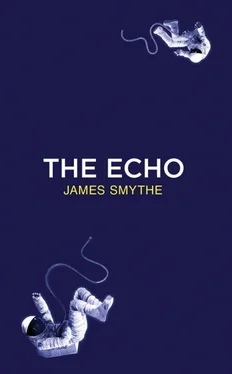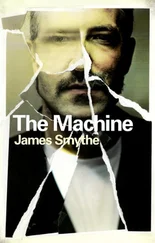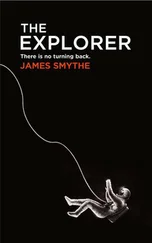‘It’s all about knowing how to meet the ground,’ she says.
‘Not a lot of that where we’re going,’ Wallace says. His quip disarms her, throws her story off. She tilts her head at him and squints. She does that, I’ve noticed, when people make a joke at her expense. It rolls off. I seize the opportunity, the gap in the conversation. Tomas told me that I should make a speech to rouse them, to make sure that we’re all on the same page. I cough for attention, and I push slightly away from the wall, into the middle of the room. They all look at me. I do not know that I am much of a leader, but I am something. I am what they’ve got.
‘Hello,’ I begin, ‘I just wanted to say a few words. There will be more tomorrow, and the press will be involved, but this is just all of us, now. We have important work to be doing out there. Very important work.’ They are all smiling. Maybe they are just humouring me, because I know that I am bad at speeches, bad at all of this stuff. I know that I am not making eye contact with them; I am looking at my hands, at the paper that I wish I had to read from. I know all of this. ‘We all remember when they did this last. We remember how it all went wrong. But they were different, because they didn’t have you people as a crew.’ I have lost their smiles. I haven’t thought this through. I ask myself how Tomas would save this, and I remember the champagne substitute. I raise my flask. ‘So, you know,’ I say, and I start clapping my hand against the flask, ‘applaud yourselves! To us!’ I raise it high, and then I say it again. ‘To us!’ They all repeat it, and we all drink, and I see them looking at each other, little glances out of the sides of their eyes. I have fucked this up, I know.
I quietly mumble at them that I have to go and do some final checks, so I fluster to the rail, leaving my food but taking my flask, and I pull myself along and back to my room. It takes too long, and when I am there I fasten myself to the chair with the magnets and I call Tomas, and I swallow the remains of my drink back in one, sucking it through the little semi-permeable straw and feeling it spark and fizz on my tongue and the back of my throat.
‘Did you inspire them?’ he asks. He was listening, I am sure. Why would he not have been listening? So this is a lie, his asking me. It’s him giving me a chance.
‘I did my best,’ I say. ‘What are you doing?’
‘We’re watching projections of what could happen if it all goes wrong.’ I don’t ask him any more about them. I’ve seen the projections myself. We are sure that we will be fine; but in case we’re not, we have to run these things. They are terrifying, because there isn’t a single one in which any of the crew manage to survive.
The reason for this mission is to examine something that we do not understand. We know it as an anomaly. We first knew about the anomaly – and, by we, I mean the world – six years after the Ishiguro went missing. The world was not told about the anomaly at the time, and so when they disappeared and didn’t come back, it was a complete disaster. Tomas and I watched it on the news: the desperate wait for any sort of news from the lost shuttle. There were so many cameras in the launch centre, with the men and their computers and the branding everywhere. Showing endless, constant VT of the various astronauts as if they were participants in a reality show. Eventually the cameras packed up, and the news cycle was reduced to a small notice at the end that simply stated how many days they had been missing for. Everybody moved on. There was a funeral when it was decided that their fuel would have run out, that their life support would have disappeared. And then, after a while, they worked out where the ship must have dropped off the radar, and then later, they announced more details. A drip-feed of updates, holding things back when they were not ready for public consumption. Records from the ship’s journey; information from the journalist, useless and garbled.
Then one day the newly named UNSA announced that they knew of something, out there in space, out where the Ishiguro had been. The UNSA was little more than a conglomerate of companies and investors and governmental bodies plucked from the remnants of NASA and other space agencies, given a ridiculous name to seem important. They disclosed that the thing first appeared a decade before. There was patch of space that nobody could see properly: as if it was nothingness. It had been designated the catalogue number 250480 – they could only give it a number because nobody knew what it was. There were hundreds of thousands of these things up there somewhere: things that we didn’t understand, but that were catalogued with their little numbers and a file on a hard drive somewhere. It had been discovered before by Dr Gerhardt Singer, and he had been on the Ishiguro to try and learn more about it. It wasn’t important, that was the party line – that Inspire the world! bullshit was the primary reason for the launch of the Ishiguro – but it was clear that it was the important thing about their trip to him. He knew that there was a differential in the readings from it, simply because you could ping it and get nothing in return. The stars that used to be forthcoming, eventually, with their locations, he got nothing back from them. The anomaly was, as best every telescope could tell, nothing. There was nothing inside it. Nothing past it. And yet, it had to be something . Even a definite nothing is always a something. Dr Singer’s readings were correct, but they were brushed to one side as something to worry about another time.
When they announced the anomaly – and I say announced, but what I’m talking about is an update on a website, not a press release – they pointed out that they had singularly failed to get readings from the thing, because the probes that they sent to it malfunctioned. That didn’t mean anything: there’s a margin of error with anything technological. Two probes they sent, over a six-year period, both ostensibly to find the wreckage of the Ishiguro , but checking out the anomaly as they went, and they returned nothing, as if the thing wasn’t there. No readings: machines could not do what humans were needed for. And that’s where Tomas and I came in. We had worked with Dr Singer before he left, when we were students, in deep admiration of his work – of his role as an explorer – and we attempted to carry on his work, when we had the time. We were fuming after they spoke publicly about the anomaly, because they were denying that it was important. Tomas and I, we knew that it had something to do with the disappearance of the Ishiguro . Nothing is coincidence. Everything that happens anywhere happens with purpose and meaning. We went to the UNSA and we showed them our results, based on Dr Singer’s research. Extrapolations and summations, but with some immutable, incontestable facts: the anomaly was either moving or growing, because the space that it occupied was different. At that distance, it was hard to gauge almost infinitesimally small movements on that scale. But it was, one way or another, closer to us – to the Earth – than it had been when Dr Singer found it, and when the Ishiguro went out to examine it. It was moving. (Or, as Tomas surmised, unfolding. He has his own theories, and I have mine. We are not that similar; or, we try and cover all bases.) We plotted exactly where it was, using readings from every telescope and satellite available to us. When you concentrate and focus, you see the things that others miss. Stars that were registering as present from one satellite at any given point might not return a ping from Jodrell Bank. We focused on the anomaly, put our careers into it, our reputations. Tomas said, It’s better to be an expert in one thing that might be important than in many things that matter only a little bit.
Читать дальше
Конец ознакомительного отрывка
Купить книгу












